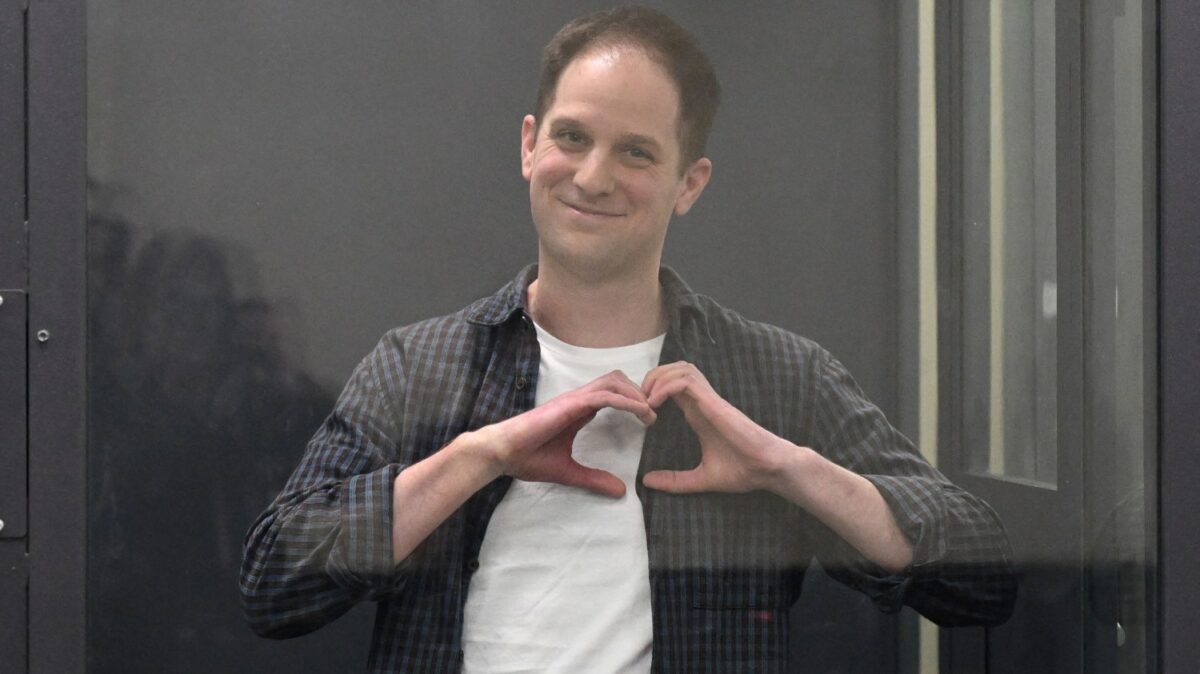I was locked up like Evan Gershkovich. This is what the West must do
As the journalist’s trial starts this week, Mikhail Khodorkovsky, who Putin jailed for ten years, says any deal should include the release of others unjustly detained by the Kremlin

The trial of the American journalist Evan Gershkovich will begin behind closed doors in a Russian court on Wednesday.
Gershkovich has been held on spurious espionage charges since March last year. As his sham trial begins, my heart goes out to him, his family, friends and colleagues — victims like so many before them of the arbitrary nature of justice in Putin’s Russia.
I know better than most that there are no fair trials under this regime. Following my arrest in 2003 on politically motivated trumped-up charges, I spent a decade imprisoned by Putin. I still remember how, after the announcement of my verdict which outraged many, a court official defended the judge on the laughable basis that he hadn’t come up with my sentence — he was merely reading out what had been prepared for him.
In Russia, judges carry the title of a proud and noble profession but are nothing more than local clerks for the presidential administration, which has a dedicated department for imposing punishments. And behind every judge sits an FSB officer, ensuring that the trial adheres to the verdict and sentence that has been predetermined.
The system is brutal. I lost consciousness many times due to the heat and lack of air when being driven to court through Moscow traffic in an iron box. But Russian courts are also a source of absurd humour and entertainment. At first it seemed crazy to be publicly called a fraudster, and crazier still when you realise that your words, your witnesses and the truth itself mean nothing at all, but you get used to it.
By our second trial, my friend and co-defendant Platon Lebedev and I asked the lawyers not to interrupt the comical prosecutor, Valery Lakhtin, who is now a general. He had clearly not even read the case and his idiotic pronouncements are what kept us going, brightening our mood during the insanely long hours of farcical process.
There is no judicial independence and no rule of law in Russia, only the will of the dictator. And, as the murder in jail of Alexei Navalny or the locking up of countless other activists or Russian citizens who have voiced dissent shows, the situation has got even worse. When I was locked up, Putin still had some fleeting consideration for how he and his regime was perceived, something that perhaps helped save my life. Yet now, a fully fledged totalitarian dictator — who has unleashed a barbaric war against Ukraine, murdered opponents and needs to visit Pyongyang to feel a warm reception — is not exactly concerned with his reputation.
None of which is comforting to Gershkovich or his family as he faces what could be an extreme sentence of up to 25 years in prison. Hope, however, is to be found in the possibility of exchanging the Wall Street Journal employee for a Russian prisoner serving a life sentence in Germany on murder charges, whom Putin wants released.
Vadim Krasikov was likely working for the FSB when he assassinated a former Chechen rebel in Berlin in 2019. Negotiations are ongoing linking the possible release of Gershkovich to the release of this Kremlin-backed killer and an exchange could take place regardless of the verdict in this week’s trial.
Such a deal — more like a hostage negotiation than any kind of judicial process — presents dilemmas of course. On the one hand, it is likely the only way to free Gershkovich before Putin dies. On the other hand, Russia has already shown, whether in Salisbury, Berlin or elsewhere, that it is prepared to murder its opponents on the streets of Western cities. Putin’s murderers will feel a greater sense of impunity to target opponents abroad. It may also incentivise the detention of innocent westerners in Russia, like Evan, for use as bargaining chips by the Kremlin. These are the quandaries faced by states who value the lives and liberty of their citizens when negotiating with a tyrant who does not.
Yet even as an opponent of Putin and one of the likely prime targets for his murderous goons, I would favour an exchange and believe the risks are worth taking. But not unconditionally. The West needs to demand a fair price.
There are many being held on ludicrous charges in Russian prisons, including other western citizens. My friend Vladimir Kara-Murza, for instance, who is a British citizen. He was given a 25-year sentence for criticising the war against Ukraine. His health is such that, like others before him, he will not be able to survive such a sentence. Meanwhile, captured Ukrainian soldiers are also languishing in Russian jails, facing slow and torturous deaths.
For too long, the West has sold itself short in its dealings with the Kremlin. Gershkovich must be released and a deal must be done, but you should not sell yourself short again. If Putin wants Krasikov back through this exchange, which he would present to the Russian public as a great success, then that deal should also include the release of others unjustly detained by his regime.
Mikhail Khodorkovsky, a former political prisoner and CEO of Yukos Oil Company, is the author of How to Slay a Dragon: Building a New Russia After Putin
The article was first published in The Sunday Times



